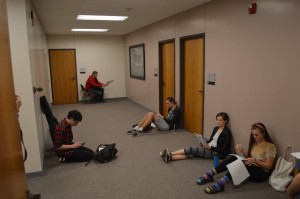For the Instant Play Festival, a group of fourteen writers gathered to stay up all night and write 10-minute plays to be performed the next day. Each play is driven by a set of “prompts” or inspirations that guide the writing process. For this set of playwrights, the prompts were 1) taking something back, 2) a movement/dance the doer does not think or know was seen and 3) a moment of indistinguishable dialogue/speaking. I sat down with three of them to discuss what they were considering doing for their writing process right before they went to write.
I spoke to Donovan Olsen first about the prompts and characters:
AR: Are you worried about the prompts you might get?
DO: I am excited about the prompts, actually. They work well with some of the ideas that I have in my head. I’m really excited to explore the combination of the ideas with the prompts tonight.
AR: When you start writing in a process like this, do you find yourself using characters you’ve thought about before? Do you use people from your life? Or do you just wait for what comes out in the moment?
DO: Most frequently, I use people in my life–or I take certain characteristics of people in my life? And create a character from that. A lot of the times, I’ll take something that’s happened to me and explore that particular scenario and the people within it.

Next, I found Reid Watson and asked about his writing process:
AR: Do you pull things from imagination when you write? Or do you find that your past is more helpful?
RW: I think that I use the imagination as a tool, but inevitably everything I end up writing comes from somewhere. I’m already thinking of some sort of character that’s this old guy, this sort of crazy uncle. This definitely comes from my family. I also think the different plays I’ve seen and the character archetypes that we’re all pretty familiar with do have an influence on what I’m writing. Yeah, I’ll definitely throw my own spin on it.
AR: What are you nervous about in this process?
RW: I think the thing I’m most afraid of is a different interpretation of the tone I’m trying to set. And I’m also afraid of writing too much, so that it’s too intricate and complex. Because ten minutes–it’s a pretty tough time constraint.
Finally, I tracked down Dani Schlenker to talk about the Saturday night show, and how she felt about writing for the next day:
AR: What was great about tonight?
DS: It was really cool to know that people were there when your stuff goes on stage. Watching people grow over this process, I mean–we’ve never written a full-on play before–so I saw that they could do it and now that I can do it. I can do it tonight.
AR: Where are you going to draw characters, scenarios, and plot from? Does it come purely from your imagination, your own personal memories, or from other sources?
DS: Actually, I– It’s funny, I already know what I want to write about. It’s actually something that one of the teachers at this school said ‘oh wouldn’t it be funny if that was a play?’ So they said that and then moved on with what they were talking about, but I haven’t stopped thinking about it since then. So I now have to write a play about it. It’s nice to be in here. I know it’s gonna be in this place.
After chatting with the playwrights, they all ran back to their laptops and began typing away feverishly, looking forward to their 9am deadline.